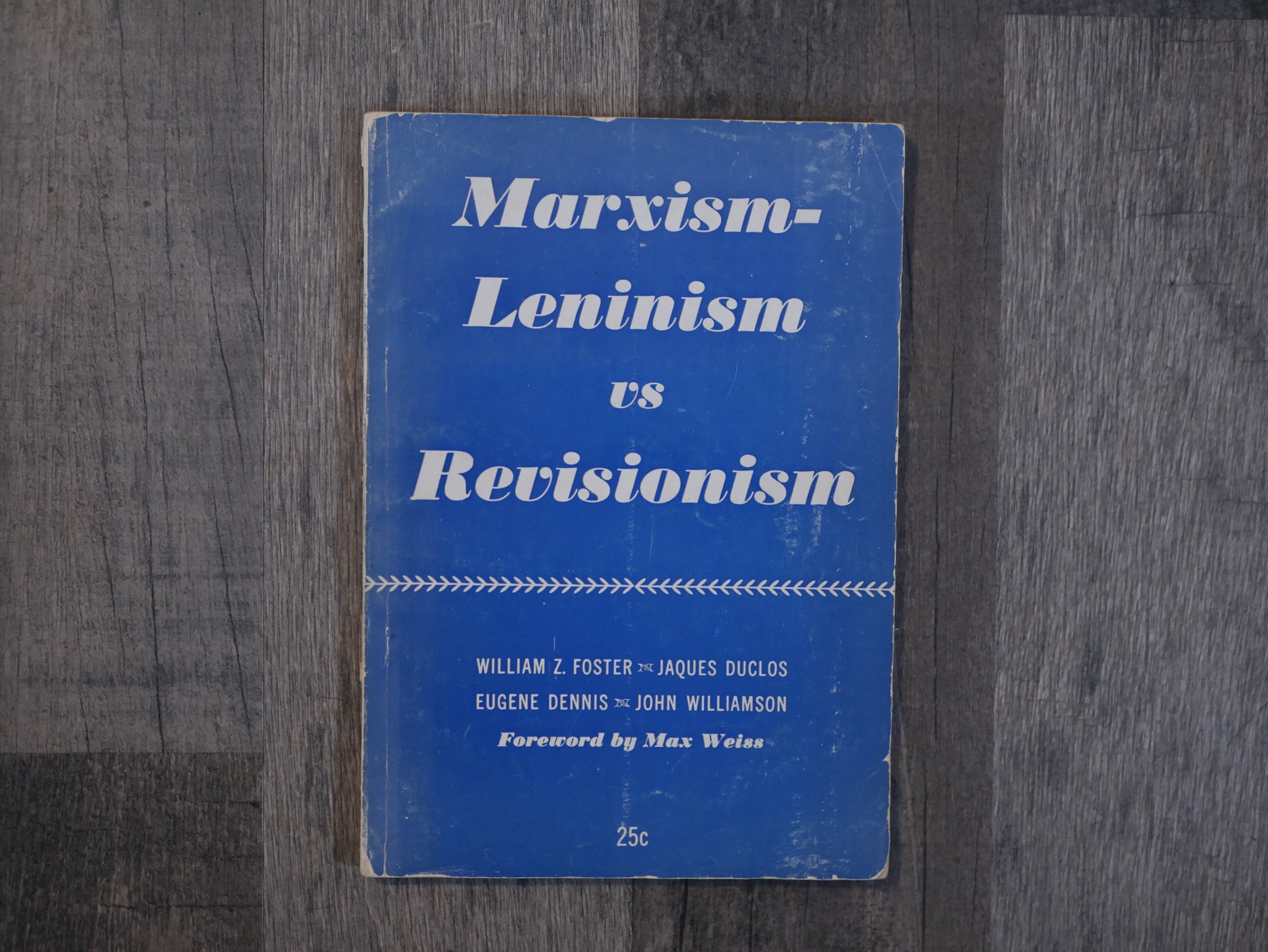 Image 1 of 3
Image 1 of 3

 Image 2 of 3
Image 2 of 3

 Image 3 of 3
Image 3 of 3




Marxism-Leninism vs Revisionism
Publication year: 1946.
Pages: 111.
Format: Paperback.
Dimensions: 5.5” x 7.75”.
A compilation of works by CPUSA members William Z. Foster, Jacques Duclos, Eugene Dennis, and John Williamson. Foreword by Max Weiss.
The letters, articles, and transcriptions contained herein tell the story of a crucial period in the history of the CPUSA. Earl Browder’s rise and the accompanying growth of his opportunistic revisionism placed him at odds with the very existence of the party; opposition to him amounted to a struggle for the life and soul of the movement. At a time of real crisis, approaching the height of WWII and following the monumental Conference at Tehran with Roosevelt, Churchill and Stalin, Browder launched a program aimed at removing the Communist Party of the United States of America from political relevancy and positioning him as a powerful toady of monopoly capital.
The leadership of Earl Browder ultimately led to errors of every type that can affect a Communist Party; theoretical, practical, structural and ideological. His theoretical errors centered around a utopian imagining of the role of big capital in the postwar period; wrapping his decrees in Marxist jargon, presenting them under the banner of unity in service of Tehran and functionally abdicating the vanguard role of the party.
The lessons of this struggle still resonate today: the lesson of insisting on both theoretical education and practice from membership; the lesson of maintaining careful and proper balance between democracy and centralism; that political alliances are based on specific common goals and do not mean ideological subordination; that adapting Marxism to current conditions does not mean revising the core principles; that posturing and phrase-mongering do not equal analysis; the list goes on.
What does it mean to exist and operate overtly as a communist party in the United States of America, the most powerful capitalist society in the history of the world; the “imperial core”? This work demonstrates the answers to these questions in action.
Publication year: 1946.
Pages: 111.
Format: Paperback.
Dimensions: 5.5” x 7.75”.
A compilation of works by CPUSA members William Z. Foster, Jacques Duclos, Eugene Dennis, and John Williamson. Foreword by Max Weiss.
The letters, articles, and transcriptions contained herein tell the story of a crucial period in the history of the CPUSA. Earl Browder’s rise and the accompanying growth of his opportunistic revisionism placed him at odds with the very existence of the party; opposition to him amounted to a struggle for the life and soul of the movement. At a time of real crisis, approaching the height of WWII and following the monumental Conference at Tehran with Roosevelt, Churchill and Stalin, Browder launched a program aimed at removing the Communist Party of the United States of America from political relevancy and positioning him as a powerful toady of monopoly capital.
The leadership of Earl Browder ultimately led to errors of every type that can affect a Communist Party; theoretical, practical, structural and ideological. His theoretical errors centered around a utopian imagining of the role of big capital in the postwar period; wrapping his decrees in Marxist jargon, presenting them under the banner of unity in service of Tehran and functionally abdicating the vanguard role of the party.
The lessons of this struggle still resonate today: the lesson of insisting on both theoretical education and practice from membership; the lesson of maintaining careful and proper balance between democracy and centralism; that political alliances are based on specific common goals and do not mean ideological subordination; that adapting Marxism to current conditions does not mean revising the core principles; that posturing and phrase-mongering do not equal analysis; the list goes on.
What does it mean to exist and operate overtly as a communist party in the United States of America, the most powerful capitalist society in the history of the world; the “imperial core”? This work demonstrates the answers to these questions in action.